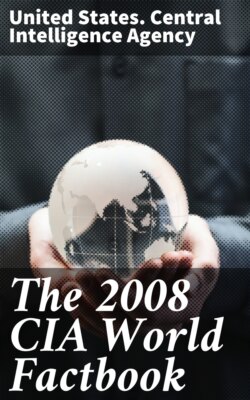Читать книгу The 2008 CIA World Factbook - United States. Central Intelligence Agency - Страница 415
На сайте Литреса книга снята с продажи.
XAF
ОглавлениеExchange rates:
Communaute Financiere Africaine francs (XAF) per US dollar - 481.83 (2007), 522.4 (2006), 527.47 (2005), 528.29 (2004), 581.2 (2003)
Communications
Equatorial Guinea
Telephones - main lines in use:
10,000 (2005)
Telephones - mobile cellular:
220,000 (2007)
Telephone system:
general assessment: digital fixed-line network in most major urban areas and good mobile coverage domestic: fixed-line density is about 2 per 100 persons; mobile-cellular subscribership has been increasing and in 2007 stood at about 40 percent of the population international: country code - 240; international communications from Bata and Malabo to African and European countries; satellite earth station - 1 Intelsat (Indian Ocean) (2007)
Radio broadcast stations:
AM 0, FM 3, shortwave 5 (2001)
Radios:
180,000 (1997)
Television broadcast stations:
1 (2001)
Televisions:
4,000 (1997)
Internet country code:
.gq
Internet hosts:
9 (2008)
Internet Service Providers (ISPs):
1 (2002)
Internet users:
8,000 (2006)
Transportation
Equatorial Guinea
Airports:
5 (2007)
Airports - with paved runways:
total: 5 2,438 to 3,047 m: 1 1,524 to 2,437 m: 1 914 to 1,523 m: 1 under 914 m: 2 (2007)
Pipelines:
condensate 42 km; condensate/gas 5 km; gas 80 km; oil 54 km (2007)
Roadways:
total: 2,880 km (2000)
Merchant marine:
total: 1 by type: cargo 1 (2008)
Ports and terminals:
Bata, Malabo
Military
Equatorial Guinea
Military branches:
National Guard (Guardia Nacional (Army), with Coast Guard (Navy) and
Air Wing) (2008)
Military service age and obligation:
18 years of age (est.) for compulsory military service (2008)
Manpower available for military service:
males age 16–49: 136,725 females age 16–49: 138,018 (2008 est.)
Manpower fit for military service:
males age 16–49: 101,712 females age 16–49: 104,381 (2008 est.)
Manpower reaching militarily significant age annually:
male: 6,784 female: 6,543 (2008 est.)
Military expenditures:
0.1% of GDP (2006 est.)
Transnational Issues
Equatorial Guinea
Disputes - international:
in 2002, ICJ ruled on an equidistance settlement of Cameroon-Equatorial Guinea-Nigeria maritime boundary in the Gulf of Guinea, but a dispute between Equatorial Guinea and Cameroon over an island at the mouth of the Ntem River and imprecisely defined maritime coordinates in the ICJ decision delay final delimitation; UN urges Equatorial Guinea and Gabon to resolve the sovereignty dispute over Gabon-occupied Mbane and lesser islands and to create a maritime boundary in the hydrocarbon-rich Corisco Bay
Trafficking in persons:
current situation: Equatorial Guinea is primarily a destination country for children trafficked for the purpose of forced labor and possibly for the purpose of sexual exploitation; children have been trafficked from nearby countries for domestic servitude, market labor, ambulant vending, and possibly sexual exploitation; women may also be trafficked to Equatorial Guinea from Cameroon, Benin, other neighboring countries, and China for sexual exploitation tier rating: Tier 2 Watch List - Equatorial Guinea is on the Tier 2 Watch List for its failure to provide evidence of increasing efforts to eliminate trafficking, particularly in the areas of prosecuting and convicting trafficking offenders and failing to formalize mechanisms to provide assistance to victims; although the government made some effort to enforce laws against child labor exploitation, it failed to report any trafficking prosecutions or convictions in 2007; the government continued to lack shelters or formal procedures for providing care to victims (2008)
This page was last updated on 18 December, 2008
======================================================================
@Eritrea
Introduction
Eritrea
Background:
Eritrea was awarded to Ethiopia in 1952 as part of a federation. Ethiopia's annexation of Eritrea as a province 10 years later sparked a 30-year struggle for independence that ended in 1991 with Eritrean rebels defeating governmental forces; independence was overwhelmingly approved in a 1993 referendum. A two-and-a-half-year border war with Ethiopia that erupted in 1998 ended under UN auspices in December 2000. Eritrea currently hosts a UN peacekeeping operation that is monitoring a 25 km-wide Temporary Security Zone (TSZ) on the border with Ethiopia. An international commission, organized to resolve the border dispute, posted its findings in 2002. However, both parties have been unable to reach agreement on implementing the decision. On 30 November 2007, the Eritrea-Ethiopia Boundary Commission remotely demarcated the border by coordinates and dissolved itself, leaving Ethiopia still occupying several tracts of disputed territory, including the town of Badme. Eritrea accepted the EEBC's "virtual demarcation" decision and called on Ethiopia to remove its troops from the TSZ which it states is Eritrean territory. Ethiopia has not accepted the virtual demarcation decision.
Geography
Eritrea
Location:
Eastern Africa, bordering the Red Sea, between Djibouti and Sudan
Geographic coordinates:
